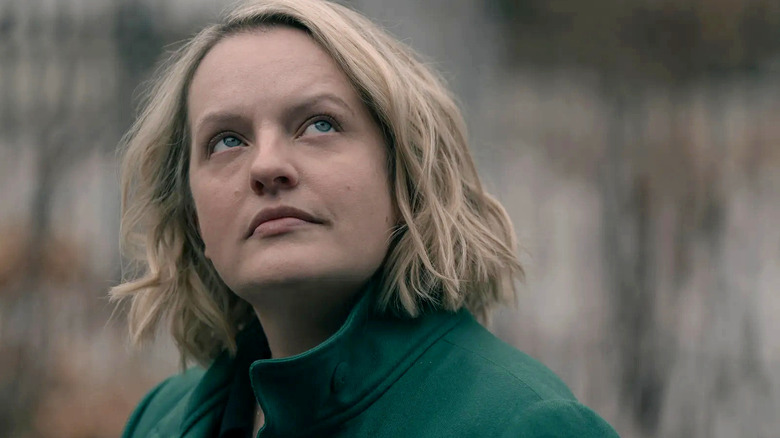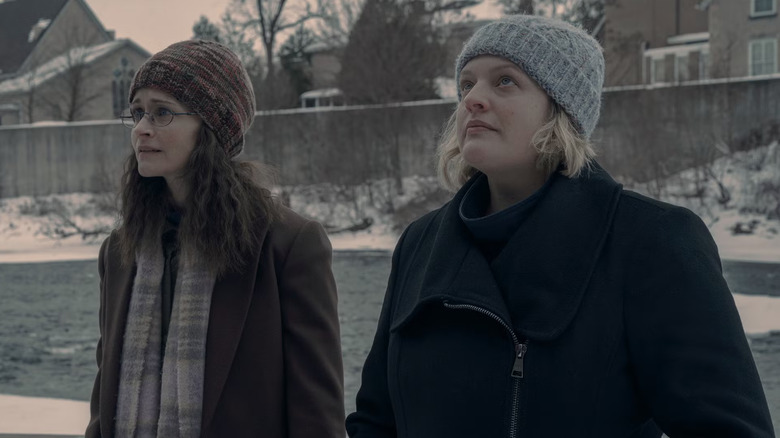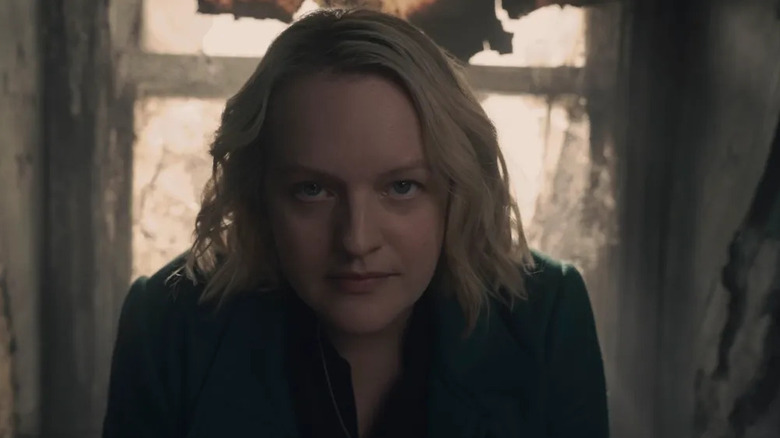The Handmaid's Tale Series Finale Is A Hot Mess, But Its Final Message Is Worth It
The last season of "The Handmaid's Tale" had explosive deaths and a deadly wedding, but the final episode is slow and impressionistic, rather than the crescendo of a climactic plot. June mostly wanders around the newly liberated Boston, thinking about her past, present, and future — and even an alternate reality where the ladies of Gilead led normal lives singing karaoke to Stevie Nicks' "Landslide." A good chunk of the episode's last ten minutes is just June walking up the stairs of the Waterfords' charred home in slow-motion. By this point in the series, the use of molasses-paced montages and extreme close-ups has lost its poeticness, becoming self-indulgent and bordering on parody.
While the dialogue-heavy callbacks, reunions, and goodbye scenes are meant to reward fans, they feel very forced. Serena begs June for forgiveness; June thanks Aunt Lydia for her final act of heroism in releasing the Handmaids; Emily makes a random reappearance and reveals she's been working for the resistance all along; Luke and June acknowledge that their relationship is irreparable. Every one of these carefully constructed exchanges screams, "THIS IS THE FINAL EPISODE!"
Everything wraps up quickly in a neat little bow, which ironically is exactly why the show creator Bruce Miller told The Hollywood Reporter that a happy ending with June finding her daughter Hannah was never in the cards. The show solely focuses on "June's journey from handmaidness to freedom. The question of how she rebuilds her family felt like a whole other step." It's unsatisfying not to see June reunite with Hannah or to only make a small dent in Gilead's downfall, yet this ending may be the most realistic — and most relevant — given our current political climate. Is hope and happiness the antidote we need right now, or would it feel disingenuous?
June explains the cost of silence and complacency
The finale offers little catharsis and is more of an introspective and artfully shot way of circling back to the beginning of June's story. The scene where June tells her mother that liberating Boston is just the beginning of toppling Gilead is the most genuine part of the episode. It conveys why "The Handmaid's Tale" shies away from offering any false hope or overly optimistic closure:
"But the thing is, Mom, I'm not safe. Neither are you. They are never going to stop coming for us. And even when we're gone, they're gonna come for our children and our grandchildren. Fighting might not get us everything, but we don't have a choice. Because not fighting is what got us Gilead in the first place."
June's observations about not fighting back recall her voiceover in the third episode of season 1:
"Now I'm awake to the world. I was asleep before. That's how we let it happen. When they slaughtered Congress, we didn't wake up. When they blamed terrorists and suspended the Constitution, we didn't wake up then either. They said it would be temporary. Nothing changes instantaneously. In a gradually heating bathtub, you'd be boiled to death before you knew it."
It seems like today, in America, we're just as deep in that boiling bathtub. Submerged in this scalding water, it's difficult to visualize a future where the next generations will escape the ideological damage that deepens with each passing day, pushing us further towards authoritarianism.
Donald Trump's presidency brings America closer to Gilead
Back in 2017, /Film writer Hoai-Tran Bui hailed the then-new series as politically relevant. That political likeness has only grown. Under Donald Trump's second term, America seems closer to Gilead than ever. The overturning of Roe v. Wade and the banning of transgender men and women from the military was just the beginning.
Now, Donald Trump is deporting immigrants without due process; he's frozen federal funding for prestigious universities such as Harvard, gutting programs that research children's cancer; he's banned the Associated Press from covering major events because they disagree with his administration. Even more alarming, he's openly discussed staying for an unconstitutional third term. These are assaults on our most basic rights: to exist, to be educated, and to speak freely. The road to fascism is being paved before our very eyes.
In final shot of "The Handmaid's Tale," June begins to write her story. She looks directly into the camera with a determined stare and says, "My name is Offred." It's her way of warning the audience: This is in your hands now. Open your eyes and do something — or you'll end up like me.
A sequel series, "The Testaments," will follow June's daughter Hannah and the true end of Gilead. If it also runs for eight years, it's hard to say where America's political landscape will be by the end. Will we have saved ourselves, or will things have only gotten worse? The "Handmaid's Tale" finale may lack a definitive conclusion, but its message is one we need to hear. We long for a glimmer of hope and the belief that oppression can end joyfully, but the only way we can achieve that in real life is if, as June says, we wake up and do as much as we can to fight back.


